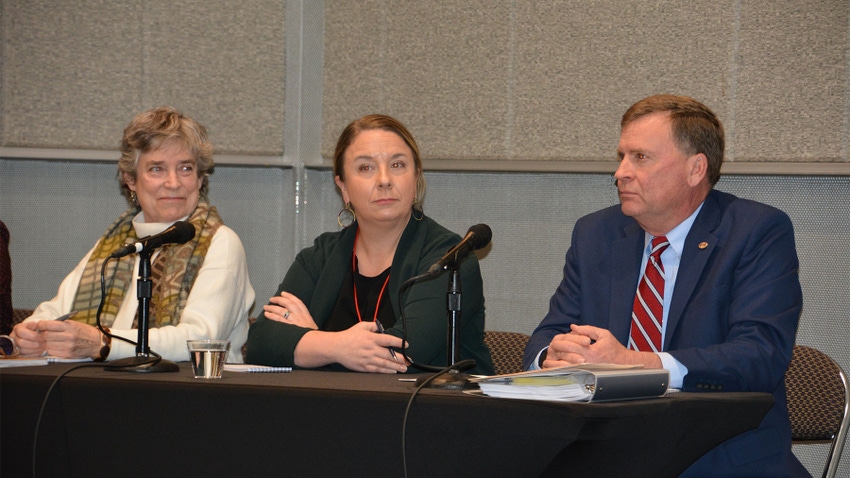
The line of the day in a recent panel discussion about farmland loss belonged to Brianna Schroeder, an attorney with Janzen Schroeder Ag Law LLC, Indianapolis.
“There are certainly challenges with the loss of farmland in Indiana, but there are also opportunities,” she said. “We are looking for balance.”
“We are looking for balance” — five simple words that rang true during the discussion. Yet balance can be elusive when some people believe farmland is simply undeveloped land waiting for development, and others bristle at using land for any purpose other than farming.
Schroeder gave an example of what “balance” looks like to her. “Many believe they can make agrivoltaics work,” she said. That’s growing crops or pasturing animals while using land to capture solar energy.
Schroeder believes agrivoltaics might be one of those opportunities. “Some might use land with solar panels to grow sheep; others might grow crops or plant pollinators,” she said. “We need to find these kinds of opportunities.”
Preservation vs. rights
“We need to protect farmland, but we also need to protect the farmer’s right to choose how he or she uses their land,” Schroeder said. Herein lies the conflict that leaves groups like Indiana Farm Bureau hearing from members on both sides of the issue — those worried about having enough land to grow food, and those concerned about protecting an individual’s rights to do as he sees fit with his property, including cashing it out.
“Farmland loss is a real threat,” Chris Coffin told the audience. She is a senior policy specialist with American Farmland Trust. AFT’s 2022 landmark study indicated Indiana lost 265,000 acres of farmland from 2002 through 2016. AFT projections indicate Indiana could lose an additional 400,000 to 600,000 acres over the next 20 years.
“Land use is always an issue in Indiana,” said Kendell Culp, Rensselaer, Ind., farmer, legislator and vice president of INFB. “Things like the LEAP [Limitless Exploration Advanced Pace] project in Boone County, which may convert 8,000 to 10,000 acres into economic development, make people more aware.”
Balance and common sense
But like Schroeder, Culp seeks balance. “Rural vitality and sustainability is a top policy initiative for INFB for 2024, based on what delegates said,” Culp said. Farmland use and preserving farmland fall under that heading, but so does economic development.
“Most of the district I represent in the Legislature does not have a high tax base,” he explained. “We need more assessed valuation to raise money to operate county governments and schools. That means we need some economic development. We also need enough jobs to support people who want to live there.”
At the end of the day, Culp believes it’s necessary to do both — to find that balance. Part of the answer may be things like agrivoltaics. Maybe it also includes smart zoning laws that make the best use of prime farmland, not allowing one house to consume 5 or 10 acres.
Maybe is also means policies that encourage farmers to continue farming, such as agricultural conservation easements, often supported through state funding. Maybe it means distinguishing between prime farmland and less valuable land, and encouraging uses like renewable energy on less valuable tracts. In truth, it means finding the right combination of all these things — finding a balance.
About the Author(s)
You May Also Like




